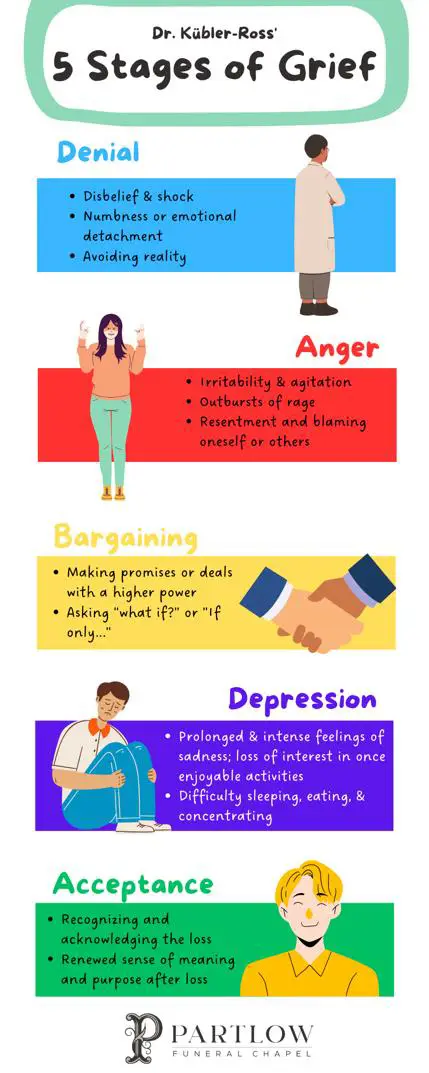Navigating the Stages of Grief
Understanding and Overcoming After Loss
Grief is a complex and universal human experience that follows the loss of a loved one, whether it be a family member, friend, or even a cherished pet. It is an emotional rollercoaster that can leave us feeling disoriented, overwhelmed, and heartbroken. Understanding the stages of grief is crucial for navigating this difficult period, as it provides a roadmap for the healing process and offers insights into the emotions that we may encounter along the way.

This article will explore the five stages of grief, coined by psychiatrist Elisabeth Kübler-Ross, as well as provide practical advice and guidance for those experiencing loss. We do want to emphasize that grief is a unique and individual journey that unfolds differently for each person and that there is no "right" way to grieve. Our aim is to help you make sense of your emotions and find comfort in knowing that you are not alone in your journey toward healing.
The Five Stages of Grief
In her groundbreaking 1969 book, "On Death and Dying," Swiss-American psychiatrist Elisabeth Kübler-Ross introduced the concept of the five stages of grief. These stages were initially developed to help individuals understand and process the emotions they might experience when facing a terminal illness, but they have since been widely adopted as a framework for understanding grief and loss in general.
The five stages of grief, outlined by Kübler-Ross, are:
1. Denial
2. Anger
3. Bargaining
4. Depression
5. Acceptance
Each stage represents a different emotional response to loss, and understanding these stages can help individuals recognize and validate their own feelings as they navigate the grieving process.
These stages are not linear and can be experienced in any order
It is important to note that the five stages of grief are not meant to be a strict linear progression. Rather, they serve as a general framework for understanding the various emotions someone might experience during the grieving process. Individuals may move through these stages in any order, and they may revisit certain stages multiple times as they come to terms with their loss.
Some people may experience all five stages, while others may only encounter a few. The duration of each stage will also vary from person to person, and there is no set timeline for the grieving process. Ultimately, it is crucial to recognize that everyone's experience of grief is unique, and there is no "right" or "wrong" way to grieve. The five stages of grief simply offer a way to make sense of the complex emotions that often accompany loss, and to provide some guidance for those who are struggling to find their footing during this challenging time.

Stage 1:
Denial

Denial, the first stage of grief, is often experienced as a sense of disbelief or shock following a loss. It is a defense mechanism that helps us temporarily cope with the overwhelming pain and distress associated with losing someone we care about. During this stage, it might be difficult for us to accept the reality of the situation, and we may find ourselves thinking, "This can't be happening" or "There must be some mistake."
Common manifestations of denial
Denial can manifest in various ways, such as:
1. Disbelief or difficulty accepting the loss
2. Numbness or emotional detachment
3. Focusing on minor details or tasks as a way to avoid confronting the reality of the loss
4. Minimizing the impact of the loss or pretending everything is fine
For example, someone who has lost a loved one might continue to set a place for them at the dinner table, unable to accept that they're no longer present.
The purpose and benefits of denial as a temporary coping mechanism
While denial may seem like an unhealthy response to loss, it serves a crucial function in the early stages of the grieving process. It allows us to gradually come to terms with the reality of our situation, providing a buffer against the intense emotions that we may not be ready to fully confront. In this sense, denial acts as a protective mechanism that shields us from the full force of our grief, giving us the time and space we need to process our feelings and adapt to our new reality.
How to move through denial
Moving through denial involves acknowledging and confronting the reality of the loss. Some strategies for doing so include:
1. Talking openly about your feelings with trusted friends, family members, or a grief counselor
2. Participating in rituals or ceremonies that honor the memory of the deceased, such as funerals, memorial services, or commemorative gatherings.
3. Recognizing and validating your emotions, even if they are painful, and giving yourself permission to grieve
Stage 2:
Anger

Anger is a common and natural emotional response to loss. It can manifest as feelings of resentment, frustration, or even rage. In the context of grief, anger often arises from a sense of injustice or unfairness about the loss. It can be directed towards oneself, others, or even at life in general, as we grapple with the difficult emotions and questions that loss brings. It could appear as an angry outburst at a spouse over a trivial mistake or as a feeling of restlessness while in a setting that’s usually relaxing and enjoyable.
Common expressions of anger during grieving
Expressions of anger during the grieving process can take various forms, such as:
1. Irritability or agitation
2. Outbursts of rage or frustration
3. Blaming oneself or others for the loss
4. Feeling resentful toward those who appear unaffected by the loss
5. Seeking revenge or directing anger towards a perceived cause of the loss
How anger can help the grieving process
While anger might be perceived as a negative emotion, it can play a constructive role in the grieving process. Anger can serve as a catalyst for action, motivating us to confront our feelings and address the challenges that our loss presents. It can also help us assert our boundaries and express our needs, which can be crucial in maintaining our emotional well-being during this time.
Furthermore, anger can be an important tool for working through feelings of helplessness and despair, as it allows us to acknowledge the pain of our loss and validate the emotions that accompany it. By giving ourselves permission to feel and express anger, we can begin to process our grief and move toward healing.
Managing anger and finding healthy outlets
Managing anger during the grieving process involves finding healthy ways to express and channel this emotion. Some strategies for doing so include:
1. Recognizing the feeling of anger and being mindful of its cause
2. Practicing relaxation techniques, such as deep breathing exercises or meditation, to help reduce feelings of agitation and frustration
3. Engaging in physical activities, like jogging, swimming, or yoga, which can help release tension and provide a healthy outlet for anger
4. Exploring creative outlets for expressing your anger, such as writing, painting, or singing
Remember, it's important to give yourself time and space to experience and express your anger in a healthy and constructive manner.
Stage 3:
Bargaining

Bargaining is the third stage of grief, characterized by attempts to negotiate or make deals with a higher power, the universe, or oneself in an effort to lessen the pain or reverse the reality of the loss. It often stems from feelings of helplessness and a desire to regain control over the situation.
Common examples of bargaining
Examples of bargaining during the grieving process can include:
1. Making promises or deals with a higher power, such as praying for a loved one's return in exchange for committing to a virtuous life or making a significant personal change
2. Pleading for a "second chance" or an opportunity to correct past mistakes that may be perceived as contributing to the loss
3. Asking "What if?" or "If only..." questions, in which the griever imagines alternate scenarios that could have prevented the loss
4.Seeking answers or explanations for the loss, often through spiritual or philosophical means
Someone in this stage may start attending religious services more frequently, hoping that their increased devotion will bring their loved one back.
Bargaining as a way to regain control
Bargaining serves as a coping mechanism that allows us to regain a sense of control in the face of the overwhelming and unpredictable nature of loss. By engaging in bargaining, we attempt to find meaning or purpose in our suffering and create a sense of order in a world that feels chaotic and unfair. Although bargaining may not change the reality of our loss, it can provide temporary relief from the intense emotions associated with grief.
Moving through bargaining and finding acceptance
Moving through the bargaining stage involves recognizing the limits of our control and accepting the reality of our loss. Some strategies for doing so include:
1. Acknowledging the bargaining thoughts and behaviors, and gently reminding yourself that they are a natural part of the process
2. Focusing on what you can control, such as how you choose to remember and honor the person you have lost
3. Engaging in mindfulness practices, such as meditation or journaling, to help you cultivate acceptance and stay grounded in the present moment
Stage 4:
Depression

Depression, as a stage of grief, refers to the deep sadness and overwhelming sense of loss that often accompanies the death of a loved one. It is important to note that grief-related depression is a normal and expected part of the grieving process, distinct from clinical depression, which is a longer-lasting and more pervasive mental health disorder. Grief-related depression may manifest as feelings of despair, hopelessness, or intense sorrow, and it often arises as we begin to fully comprehend the magnitude of our loss.
Common symptoms of grief-related depression
Common symptoms of grief-related depression can include:
1. Prolonged and intense feelings of sadness or despair
2. Loss of interest in activities or hobbies that were once enjoyable
3. Changes in sleep patterns, such as insomnia or excessive sleeping
4. Changes in appetite, including overeating or loss of appetite
5. Difficulty concentrating or making decisions
6. Social withdrawal or isolation from friends and family
7. Persistent feelings of guilt or worthlessness
Acknowledging and addressing depression during grieving
Acknowledging and addressing depression during the grieving process is essential for several reasons:
1. It validates the intense emotions that accompany loss and helps us recognize that our feelings of sadness and despair are a normal part of the grieving process.
2. It encourages us to seek support from friends, family, or mental health professionals, who can provide guidance and comfort during this challenging time.
3. It helps prevent the development of more severe or prolonged mental health issues, such as clinical depression or complicated grief, which may require more intensive treatment.
Coping with depression and seeking professional help when needed
Coping with grief-related depression involves finding healthy ways to manage your emotions and seeking support when needed. Some strategies for coping include:
1. Seeking support from friends, family, or a grief counselor, who can help you process your emotions and navigate the grieving process
2. Engaging in self-care activities, such as regular exercise, maintaining a balanced diet, and practicing relaxation techniques
3. Establishing a new daily routine to help provide a sense of structure and stability
This can be especially important after losing a loved one whose presence was a regular part of your life.
If your feelings of depression become overwhelming or persist for an extended period, it's essential to seek professional help. Mental health professionals, such as therapists or counselors who specialize in grief, can provide valuable guidance and support during this challenging time. Remember, reaching out for help is a sign of strength and commitment toward healing.
Stage 5:
Acceptance

Acceptance, the final stage of grief, refers to the gradual process of coming to terms with the reality of the loss and integrating it into our lives. It is important to note that acceptance is not the same as "moving on" or forgetting the person who has died. Instead, it involves acknowledging the permanence of the loss, adapting to a new reality without the presence of the loved one, and finding ways to continue living meaningfully.
What acceptance looks like and how it differs from "moving on"
Acceptance in the context of grief can manifest as:
1. Recognizing and acknowledging the reality of the loss
2. Finding ways to honor and remember the person who has died while embracing new experiences and relationships
3. Rebuilding a sense of identity and purpose without the presence of the loved one
4. Feeling a sense of peace or resolution regarding the loss, even though feelings of sadness may still be present
While "moving on" may imply leaving the past behind or detachment from the memory of the deceased, acceptance is about integrating the experience of loss into our lives and finding a way to carry the memory of our loved one forward. This could be a widow deciding to travel to a destination that she and her late husband always wanted to visit and performing a ritual of remembrance once she arrives.
The significance of acceptance in the grieving process
Acceptance is a crucial stage in the grieving process, as it allows us to:
1. Begin the process of healing and rebuilding our lives after loss
2. Develop new coping mechanisms and strategies for managing the ongoing emotions associated with grief
3. Discover a renewed sense of meaning and purpose, even in the face of loss
4. Foster resilience and personal growth by learning from our experiences of grief and loss
Fostering acceptance and embracing a new reality
Fostering acceptance and embracing a new reality after a loss involves:
1. Allowing yourself the time and space to process each emotional stage
2. Engaging in activities and rituals that honor the memory of your loved one, such as creating a memorial or participating in traditions that were meaningful to you both.
3. Focusing on personal growth and self-discovery, exploring new interests, and building new relationships while carrying the memory of your loved one with you
Navigating the Stages of Grief: Tips and Strategies
As we mentioned at the beginning of this article, it's essential to recognize that the grieving process is unique to each person and that there is no "right" or "wrong" way to grieve. The stages of grief may not occur in a linear or predictable fashion, and individuals may experience them in different orders or for varying durations. It's important to be patient with yourself and respect your own grieving journey, allowing yourself the time and space to heal in your own way.
To give a brief overview of some of the helpful tips for coping with grief:
1. Seeking support from friends, family, or a grief counselor, who can help you navigate the complex emotions and challenges associated with loss
2. Practicing self-care by prioritizing your physical, emotional, and mental well-being
3. Allowing yourself to experience and express your emotions, rather than suppressing or denying them
4. Establishing a new daily routine to help provide a sense of stability and structure during this difficult time
5. Engaging in activities that honor the memory of your loved one, such as memorial events or participating in meaningful traditions
Conclusion
Understanding the stages of grief can provide valuable insight into the complex emotions and challenges that accompany the loss of a loved one. By recognizing the different stages—denial, anger, bargaining, depression, and acceptance—we can give context to the emotions we feel, while better navigating the process and supporting others who are experiencing loss.
While grief is a painful and difficult experience, it's important to remember that healing is possible. If you or someone you know is struggling with the grieving process, consider seeking additional resources and support. Reach out to friends, family, or a grief counselor for guidance and comfort during this challenging time. You might also explore grief support groups, books, or online forums where you can connect with others who have experienced similar losses.
We at Partlow Funeral Chapel are here for you during your journey. If you're struggling with grief or just need someone to talk to, please don’t hesitate to reach out.
